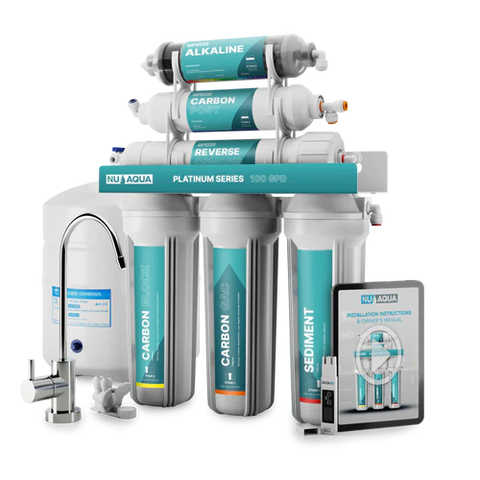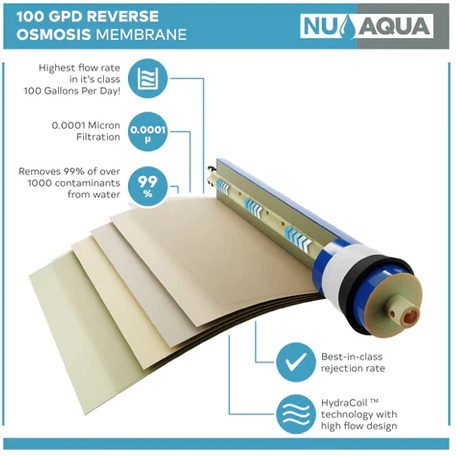Benefits of RO Water
Despite concerns surrounding the demineralized nature of reverse osmosis (RO) water, it's important to recognize the significant benefits it offers, particularly in terms of reducing potential risks to kidney health and enhancing overall well-being. The purification process of RO water ensures the removal of a wide range of contaminants, which can be particularly beneficial for individuals with certain health conditions or those seeking the highest quality drinking water.
One of the standout benefits of RO water is its effectiveness in reducing the risk of kidney stones. Kidney stones can form when certain minerals and salts in the urine concentrate and crystallize. Drinking water that contains high levels of these minerals, particularly calcium and oxalates, can increase the risk of stone formation. By removing these and other potential stone-forming contaminants, RO water can play a crucial role in kidney stone prevention, offering a purer alternative that may reduce the likelihood of stone formation.
The Importance of Clean Water in Preventing Kidney-Related Diseases
Beyond kidney stones, the overall purity of RO water can contribute to the prevention of other kidney-related diseases. Contaminants such as heavy metals (e.g., lead and mercury), pesticides, and industrial chemicals can pose significant risks to kidney health over time. The kidneys are responsible for filtering these substances from the blood, and prolonged exposure can lead to an increased burden on these organs, potentially contributing to chronic kidney disease (CKD) or other renal complications. By providing a source of water that is virtually free of these harmful substances, RO systems offer a protective benefit for kidney health.
Counterarguments to Concerns About Demineralized Water
While the demineralization aspect of RO water raises concerns, it's important to consider the broader context of dietary mineral intake. Most individuals receive the majority of their essential minerals through their diet rather than from drinking water. Foods rich in calcium, magnesium, potassium, and other necessary nutrients can adequately compensate for the minerals removed during the RO process. Moreover, the risk of mineral deficiency specifically due to consuming RO water is relatively low for individuals with a balanced and varied diet.
Furthermore, the potential for RO water to contribute to an acidic body pH is often overstated. The body's buffering systems are highly effective at maintaining pH balance, and the impact of drinking water on overall body pH is minimal. Additionally, the option to remineralize RO water, either through post-filtration systems that add essential minerals back or by using mineral drops, provides a practical solution for those concerned about demineralization. A perfect example is the NU Aqua Platinum Series 6 Stage Alkaline 100GPD RO System.

The NU Aqua Alkaline 5 Stage Remineralization Filter Kit that comes with the system replenishes water with essential minerals, including:
-
Calcium: Vital for the development of strong bones and teeth, calcium also plays a key role in regulating heart health and blood pressure.
-
Magnesium: Crucial for bone health, magnesium also manages blood sugar levels and supports nerve function.
-
Selenium: An antioxidant that guards cells against damage, selenium is important for maintaining thyroid health.
-
Zinc: Involved in numerous bodily processes, zinc aids in wound healing, boosts immune function, and enhances taste perception.
-
Iron: Necessary for the production of red blood cells, iron assists in oxygen transport throughout the body.
Beyond these minerals, the filter kit includes Maifan, Tourmaline, and ORP Balls, which are believed to offer extra health advantages, such as boosting energy levels, enhancing sleep quality, and mitigating inflammation.
While it's important to be mindful of the need for a balanced intake of minerals, the advantages of RO water, especially for those in areas with poor water quality or specific health concerns, are undeniable.
Enhancing RO Water for Kidney Health
Recognizing the purity benefits and mineral concerns of reverse osmosis (RO) water leads to a practical discussion on how to enhance RO water for optimal kidney health.
Methods to Remineralize RO Water at Home
For those who rely on RO water but want to address the demineralization issue, there are effective ways to add essential minerals back into the water:
-
Remineralization Filters: Some RO systems come with or can be fitted with remineralization filters. These filters add back a balanced mix of minerals such as calcium, magnesium, and potassium, which are essential for health.
-
Mineral Drops: A simple and cost-effective method is to use mineral drops or concentrates specifically designed for drinking water. These products allow for precise control over the mineral content of your RO water.
-
Alkaline Pitchers: Alkaline water pitchers not only increase the pH of water but often also add minerals back into the water, making it a convenient option for those looking to enhance their RO water.
Balanced Diet to Compensating for Mineral Loss in Water
It's vital to remember that a well-rounded diet is the primary source of essential minerals and nutrients, not water. Consuming a variety of fruits, vegetables, nuts, seeds, and whole grains can easily compensate for any minerals lost through the RO water purification process. For individuals concerned about their mineral intake, consulting with a healthcare provider or a nutritionist can help ensure that their diet provides all the necessary nutrients for optimal kidney health and overall well-being.
Recommendations from Health Professionals on Drinking RO Water
Health professionals often emphasize the importance of considering individual health needs and local water quality when deciding on using RO water. For most people, drinking RO water will not lead to mineral deficiencies, especially if they are mindful of maintaining a balanced diet. However, for those with specific health conditions or dietary restrictions, consulting with a healthcare provider is advisable. Additionally, for individuals living in areas where the tap water is known to be high in contaminants, the benefits of using RO water can significantly outweigh the concerns regarding demineralization.
In cases where remineralization or dietary compensation is not feasible, health professionals may recommend specific supplements to ensure adequate mineral intake. However, supplementation should be approached with care and under professional guidance to avoid over-supplementation, which can also have adverse effects on health.
We encourage you to consult with healthcare providers for personalized advice, especially when considering changes to your water consumption habits or if you have pre-existing health conditions.
Conclusion
As we've explored the various facets of RO water—from its purification process to the potential concerns and benefits regarding kidney health—it's clear that the conversation is not about choosing between good and bad, but rather about making informed decisions that align with individual health needs and environmental circumstances.
Choosing a reverse osmosis system for home as your primary source of hydration should be an informed decision, considering both the purity benefits and the implications of demineralized water. For individuals in areas with poor water quality or specific health vulnerabilities, RO water offers a valuable solution for reducing exposure to contaminants. Meanwhile, addressing the mineral content can be managed through dietary adjustments, remineralization filters, or supplements, ensuring that your body receives the nutrients it needs for optimal health.
As we continue to seek the best for our health and the environment, the role of technology like RO systems in providing safe drinking water is undeniable. However, it's the balance of embracing these advancements while being mindful of our nutritional needs that will guide us toward a healthier future.






